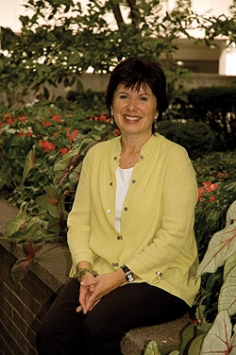In 1975 the unthinkable happened: Paula D'Arcy lost her husband, Roy, and 21-month-old daughter, Sarah, after a drunk driver hit their car. Pregnant at the time, Paula survived-only to be plunged into excruciating grief over her loss.
As painful as it was, D'Arcy now recognizes that grieving was the best thing that has ever happened to her. Learning to let go and recognizing that all of life is fragile led to a radical spiritual transformation that enabled her to see her Catholic faith in a new light.
Now she dedicates her life to helping others with their grief. She writes, gives retreats, and has created the Red Bird Foundation to help those in prison, shelters, and poor countries.
Her books include Song for Sarah: A Mother's Journey through Grief and Beyond (Harold Shaw, 1979), Gift of the Red Bird (Crossroad, 1996), and her latest, When People Grieve (Crossroad, 2005).
When she came to our office for this interview, she had just returned from Louisiana, where she had led grief groups for survivors of Hurricane Katrina.
After the death of your husband and daughter, what did you learn in your grieving?
I feel in many ways like I didn't even begin to have faith until after the accident. Before that, faith was a heady, intellectual collection of beliefs. The questions I asked in my grief-What is the meaning of life? Is there really a God who's greater than this tragedy?-those questions were asked from such a deep place because I wasn't going to make it unless the answers were real. It wasn't an intellectual quest at all.
Of course, there was a lot of heartache and incredible sadness and anger. Suddenly all of my illusions and assumptions were exposed for what they were. Everything that pretends to be a matter of life and death but isn't revealed itself.
As I made my way through the grief, I realized that there are two levels of life: One is the small story of your life and the other is this movement of the spirit of God trying to help our souls awaken to a power greater than anything that will ever happen to us. Grief was the opening through which I found that power.
In many ways it was a great gift to be broken open at so young an age because it gave me the rest of my life to benefit from what I'd learned. At 27, I had begun to believe that my roles-wife, mother-were who I was. I didn't have a single anchor that was deeply rooted within me. That also was a great gift of the grief. No matter what else might happen, I'd found a place inside that is greater than the darkness.
Did your image of God change?
I didn't really know what my image of God was until the accident. I thought that people who were basically good and not harming anybody should not themselves be harmed. I used to have an image of a God who would stop a speeding car or bullet. But that obviously isn't how God operates.
In the aftermath of my loss, I prayed what I think was the first honest prayer of my life, which was "God if you are really out there and if you are real, then help me, let me find you, show me who you are." That's when there was a major shift from a God out there to a God within.
What about people who say that in order for God to bless us, sometimes God has to take us through a lot of pain?
I don't agree with that. I don't have an image of a God saying, "OK, so let's discard Roy and Sarah so that Paula can go through this experience and gain something." But I think in that experience I became teachable because I stopped feeling a sense of my own control. I was powerless.
So why is that idea of God causing pain so persistent?
I think humans have a desperate need to have things make sense, to have answers.
I gave up having to have the answers and to figure it out. Everyone says, "When I die I have these questions for God." But I realized I had no questions. The only point of life is letting go of our own ego's needs and desires and coming to know God's love.
A favorite scripture passage of mine is when Jesus is walking along the Sea of Galilee and tells certain men to put down their nets and follow him. It sounds like a very romantic story, but in fact that moment turned their lives completely upside down.
Into every life comes opportunities and times when something is saying to you, "Put down your nets and follow me." Your nets are your conclusions, your images of the way you wanted your life to go.
How were you able to make that spiritual shift?
I looked at what strengthened me and what weakened me. I realized every choice has a ripple. If I wanted to get to a deeper place within, I had to support that with the decisions I made.
I looked, for instance, at which friendships strengthened me and which did not. The late spiritual writer Father Henri Nouwen had a great phrase: "Control your own drawbridge." Pay attention to who is walking in and out of your life. With most people, the drawbridge is down and they allow anybody to come in and out. You have to think about what you're feeding yourself and your soul.
After the accident I had many friends who were in their 80s. People used to laugh at that, but these older friends were already at that point in life where they knew what really matters. They got it.
What can people do to help someone in their grief?
The single most important thing that people can do is just to be willing to be with you in your pain and not try to fix it-not give their own conclusions such as, "It was really a blessing; she's in heaven now with God." That hurts if you're not ready to hear it.
Nobody can say to you, "There's a gift in this." Ultimately you can come to that yourself, but it has to come from within. I eventually did realize that life is precious, and you shouldn't waste a minute of it. That drastically changed the way I raised my second child because I realized I don't own her, she doesn't belong to me. She is pure gift, and you absolutely treat a gift and a possession differently.
I had an antenna for people who were comfortable with their own pain and those who weren't. Those who weren't wanted to make small talk.
I hated it when people would say, "By now you should be taking off your wedding band or packing away their clothes or getting back to work." That was their need for me to get this fixed because it made them uncomfortable. They didn't want to realize it might happen to them. Once someone said her husband was away for a weekend so now she knew what it felt like to be a widow. Such comments were hurtful.
But then someone else might take me out for a walk at the ocean. It was a real chance to talk, and I needed people to hear the story. I had to keep telling it because I was still believing it as I was telling it.
Then there was the secondary team, the people who could do practical things like grocery shop and babysit. God bless them, because not everybody is wired to be the confidante.
Sometimes your best friends are not able to do the grief journey with you. That was really hurtful at first, but years later I understood that people are in our lives for different reasons and have different gifts.
Do you think the church's rituals around death are helpful to people who are grieving?
I think some ritual is necessary. Some other cultures do it better than we do in mainstream America. But the wake, where you have a chance to see the person and say goodbye, is important. So is having people surround you in your grief. I felt lost to myself, but other people remembered who I once was and they held that memory for me. Their presence said: The community is still here.
But many people who don't have that kind of community are walking around with so much repressed grief and pain. When I work with prisoners and people in shelters, I see so much unacknowledged grief and pain. Those people don't even have a chance at their lives until the pain is dislodged.
Repressed grief is like a beach ball that you try to hold underwater but that wants to keep popping up to the surface. You're allocating a certain amount of your energy to keeping that ball under water. You fear that if you allow the pain to become conscious, you'll start crying and never stop. That speaks to the amount of pain that's underneath.
Catholic author Father Richard Rohr said it well: "Pain that is not transformed will be transmitted."
What about the stages of grief?
I do believe the stages of grief are accurate, but I don't think they're that neat. I'd like $10 for every time I thought I was done with anger and could move on to acceptance, then all of a sudden I was angry again.
It's disheartening if you don't undertand grief. It doesn't mean the healing work that you did last week doesn't count. Only that you've gotten a little stronger and are now able to feel the force of the pain more.
Does grief have to include a crisis of faith?
I have a very close friend in her 40s who had already been on a very strong faith journey when her 22-year-old son was killed by a drunk driver. I was able to watch how somebody with a mature faith experienced the pain and the loss-but not the suffering of having it rip apart all your theories about life and God. I realized that the largest part of my suffering came because all those images were shattered with nothing to replace them. None of my theories were strong enough to hold that kind of pain.
This friend was extraordinary in her grief. There was an amazing moment with her in the emergency room when she went to be with her son after he died. She asked me to join her, so I walked in and she was standing over the gurney looking at her son. She said to me, "He never was really mine, was he?"
I said, "None of them are ours." And she said, "Then it's not true that God has taken him from me. He was a gift, and I'm going to give him back."
She asked me to take her son's hand, she took his other hand, and we formed a circle. Then she looked up and said, "God, this was without question the most treasured gift you have ever given me and I thank you profoundly for that, and in this moment, I give him back to you."
That was real faith.
How does grief affect a marriage?
Studies show that 87 percent of marriages do not survive the death of a child. You have two separate people simultaneously going through the worst thing they have ever gone through. The person who has always been your shoulder to cry on is in the same place.
I had good friends who tried to navigate it by going to other people for support, but ultimately they divorced because they lost the intimacy of those years. Couples who navigate grief well are able to intermittently be there for one another but do not expect too much from each other.
Grief is like a searchlight that illuminates the hidden inner things of your life. If there are weak links in your relationship, it puts tremendous pressure on them. If the weak links are significant, the chain breaks. It takes tremendous courage and maybe luck to escape that.
People grieve in such different ways. One woman complained after the death of her two teenage sons in a car accident that her husband wasn't grieving because he wasn't crying. But he and those sons used to rebuild cars, and after their deaths he was in the garage rebuilding the last car. That was his grief work.
Doesn't it seem like certain people have more than their share of grief?
I don't understand it, but I think it's absolutely true. People sometimes get more than they're able to bear. There isn't a quota system. I did think after Sarah died that surely Roy wouldn't die. But he did. But then you start to open your eyes and see people all over this world losing multiple people all the time.
So then the question becomes, "How am I going to live? Am I going to live with my heart closed because this happened to me?" What an awful outcome, refusing to love again. I wanted the direct result of those lives touching mine to be greater love in me.
How did you do that?
I think the only way to grow in compassion is to get the cover ripped off. The ego does not surrender easily. As that shell is ripped open, it feels like death, but the only way to understand it is that on a deeper level the divine is trying to break through. Something was trying to be wrought within me. That's how I understand Incarnation.
In some ways, other traditions put this in more usable terms, like "awakening." But in our tradition the mystics are an example of people who "got it." And Jesus came to embody it, to show what it's like when the divine breaks through the human. This level of love teaches us which things really matter in life and which don't.
What can parishes do to help those who are grieving?
First, they can recognize that it is difficult for many people to immediately return to their home churches. Sometimes people need a neutral place without memories.
I encourage churches and ministers of care to keep a grief calendar and write down the day of the loss. Then flip ahead, say, four or six months and remember to check in. By then the shock has begun to wear off and the full impact of grief is felt. Too many people think you should be OK by then and have stopped calling.
It's much easier to respond to a specific invitation, like "Would you like to go with me to 8 a.m. Mass?" The biggest throw-away line is "Call me if you need me." For people in the shock of grief, the distance to the telephone may as well be across the Sahara.
What about people who seem to get over their grief really quickly. What's the danger in that?
That you haven't done the inner work, or that you're trying to hold up appearances. Healing can't be rushed. Some people say, "Well, we're Christians, so we just accept this," as if there were no grief. I don't trust that.
Each person has a unique journey. Each bereaved hearts finds his or her own way. Whenever any community gets rigid and says, "Here are the ways to feel, here are the answers," I'm suspicious.
Will this always be a part of you?
I was 27 years old when the accident happened, and 27 years later I believed I had reached a line of demarcation: Now the loss was behind me. On that day, I was in Houston at a red light and a man ran the light and hit my car. The same day. I couldn't believe this could happen to me again. I fell apart.
But then a friend said that perhaps you can't ever put something like that away. It was part of my deepest pain but also the opening for my most brilliant light, so if I was "done with it," I would also be done with the brilliance.
I dreamed of having lots of children, but I ended up having only one daughter. That's not what I would have chosen. But my life has taken me deeply into the lives of children I would have never known. I wanted to be married to Roy D'Arcy for the rest of my life. Yet so much love has still come into my life. If I had clung to only one form of love, I would have suffered all my life.
When I die, I'm going to say I had an amazing life. People ask me if I could have back the past but had to sacrifice what I know now, would I do it? I wouldn't, because the learning has been too great. That life was wonderful, but it was always fragile. Now I see much greater meaning in this life, and I wouldn't trade that.















Add comment